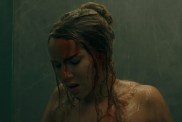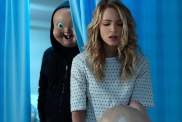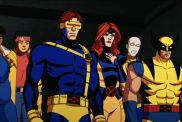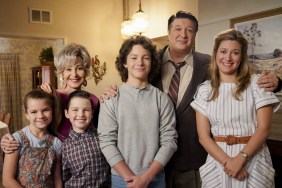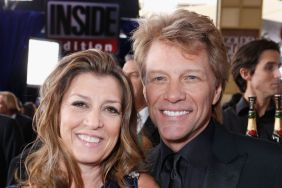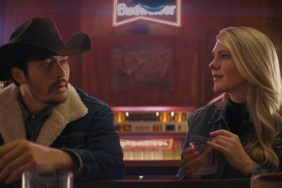Screenwriter & exec. producer of Dexter

Adapting Twilight. Not exactly a dirty job – certainly a demanding one – but someone had to do it. And that would be screenwriter Melissa Rosenberg, the first to leap in with enthusiastic vigor and creatively lend her name to Summit Entertainment’s screen incarnation of the Stephenie Meyer novel about vampires, werewolves, and more importantly Bella (Kristen Stewart), the young woman who falls head over heels for an immortal named Edward (as played by Robert Pattinson). In addition to penning 2006’s Step Up, Rosenberg is a producer and writer on Showtime’s feel good serial killer series Dexter, now entering its third season. Before that, it was spending time in The O.C. and flying with the Birds of Prey.
In the ever-heightening press saturation surrounding Twilight which has put the spotlight on the young cast, we felt it was time to turn our attention to the one who was at the onset of this adaptation. The following is ShockTillYouDrop.com’s discussion with Rosenberg who took some time away from her duties on Dexter to talk to us about the writing process and the undeniable allure Twilight, bound to age-old themes of vampirism, has on its readership. Oh, and she’s got a bit to say about Dexter Morgan, too.
ShockTillYouDrop.com: Was Twilight a project you pursued or did Summit approach you about it?
Melissa Rosenberg: They came to me, actually. I had written Step Up for them and we had a really great working relationship with them. They had asked me to do Step Up 2 but I was unavailable. When I turned that down I thought I ruined my relationship with them, but eight months later they called and asked How do you feel about teens and vampires? Are you kidding, I love teens and vampires. [laughs] They turned me onto this book and I loved it.
Shock: It seems everyone who sits down to read the novel plows through it in a matter of days, if not hours – did you have a similar experience? And what was your initial reaction?
Rosenberg: I read it over the course of eight hours – one long day – because we were moving so quickly on the film and I got caught up in it. I loved the mythology she created. Vampires are probably an overdone genre in storytelling. We’ve all seen a gazillion different vampire movies. And to bring something new to it is very difficult to do. The last person to do it well was, I think, Joss Whedon and before him Anne Rice. Now we’ve got Stephenie and she has reinvented the mythology while staying true enough to it that aficionados can still sink their fangs into it. [laughs] I was just really impressed and delighted with her inventiveness. At the heart, the relationships and the characters she brings to it are great and is always what makes it different, who the characters are.

Shock: The first Step Up was your first feature film, Twilight your second, furthermore, an adaptation which can be tricky. Can you talk about the process of sifting through what Meyer established then deciding what to keep and what to excise?
Rosenberg: It was less trimming the fat and more condensing it. There are a lot of conversations that play well obviously in the book, less so on the screen – the sitting and talking scenes, I mean. The essence of it, you distill it down to the essence of those character’s emotional arcs and still hit the same points to move the story forward and stay true to the book. With something like this that has such a huge fan base, our intent all along was to stay true to the book and it has to do less with adapting it word for word and more with making sure the characters arcs and emotional journeys are the same. Whether it’s the scene in the cafeteria where they’re having a twenty page conversation or them walking by a bridge, getting that emotional beat is an important element.
Shock: Because this is all being told from Bella’s perspective, how do you get through those moments where the character is silently fawning over every miniscule thing Edward does? She describes them at great length and it’s all internalized.
Rosenberg: Well, you have to give the director a scenario in which they can pull it off. You have to create a situation in which the actors and director, if you’re not going to hear what they’re thinking, you have to see it, choreograph it on the page. I would definitely not be doing my job if I left that up to the cast and the director to figure out. Improv. [laughs] You’ve got to set the scene then have the actors live into that moment.
Shock: Taking that a bit further, was there anything in the novel that you found difficult to put on the screen and which required you to bring something new to the table?
Rosenberg: Absolutely, I was able to bring some stuff to the table, but it’s born out of the essence of the book, the intention. The evil vampires, for instance, don’t even show up in the book until the last twenty-five percent of the story, but you’ve got to figure they’ve been around. Where have they been? What are they doing? I’m taking from the book the characters Meyer create and giving these guys a little story. I’m letting the audience know there’s this impending thing. Plus, those characters are fun. [laughs] Any time I can put them on screen was fun.

Shock: Out of the characters in Twilight, whose headspace did you enjoy roaming around in?
Rosenberg: James was a great deal of fun. But Charlie the dad was great. He’s a rich character. Like Bella, he’s difficult because those two are very taciturn, you have to find those moments. While writing it there were very terse little scenes that bring so much weight to them I love it, I love the actors playing them. I really liked doing the human friends. Some of them were condensed. That’s where we had to cut back on characters and obviously we’re not going to cut back on the Cullens. So, we distilled some of the human characters into one. The character of Eric is now a combo character and he was a great deal of fun to write for. Jessica has been distilled and she’s fun as well.
Shock: Did Summit and Meyer have to approve any slight alterations you made?
Rosenberg: What happened was this book had been optioned in galleys over at Paramount many years before Summit got it. I think it was MTV who was developing a script over there – I never read it, they wouldn’t let me – but Stephenie said it was a good script but it didn’t have anything to do with her book. I think she got very concerned about optioning it to another studio because she wanted her book to be adapted. When she went to Summit and they convinced her to let them option it she insisted on a series of things that absolutely had to be in the book. Things that could not be changed. For instance, the characters had to be the same, the vampires had to have the same skills and same limitations. We had this manifesto we started with that was a couple of pages. They sent it to me and I thought there was absolutely nothing on that manifesto that would hamper me. We’ve all had favorite books adapted for the screen then say Why did they do that?
Shock: What do you think the fan base is responding to with these novels?
Rosenberg: I think it’s a number of things. To begin with Bella, we’ve all been that girl. For women, anyway. We’ve all been this human, fallible person. And the vampire lore lends itself to the ultimate unattainable love. That longing we have felt, that delicious longing. I think that’s why the lore itself is so popular. For Stephenie, she has created this family of these somewhat unattainable, mystical people who are good. They’re accessible. She lays it out so slowly, she lures you in – because it’s being told from Bella’s point of view, you’re experiencing Edward and his family from her point of view. Little by little, you’re learning who this beautiful guy is and drawing you into just how human he is. Stephenie’s pacing and characters just draw you in.
Shock: Could Meyer have pulled it off with anything other than vampires?
Rosenberg: The unspoken sexuality is fairly exclusive to the vampires, but as you go on in this series, the werewolves become important as well. I’m glad she brought that to the werewolves. But the vampire is one of the few creatures that carries with it this tantalizing sexuality that’s just right on the edge of the surface.

Shock: Are you all caught up on the novels now?
Rosenberg: I’m right in the middle of Breaking Dawn.
Shock: What are your feelings on it so far?
Rosenberg: Don’t tell me the ending! So far I’m loving it. Every time I turn the page I’m like, Wow, she is really going there?! She just took the reins off. It’s like the first three books were restraint, restraint, restraint and suddenly she’s going hog wild. It’s such a bold thing to do, for a writer of a beloved series to go This is my world and I’m taking it here. I’m pulling the doors back and letting everyone look in. It’s incredibly satisfying after these books full of mystery.
Shock: Now, are you scripting New Moon?
Rosenberg: I’m…going to have to go with a no comment. There have been discussions. The future is being kept under wraps.
Shock: Turning to Dexter quickly, I know you can’t say much about the third season, but what can we expect?
Rosenberg: We’re shooting episode seven now, we’re writing nine and we’ve got about three more to go. Dexter’s evolution continues. He’s moving toward humanity at a slow pace. Inching toward it with new experiences. The thing about this season…he’s always got a need for connection because he’s such an isolated person. So throughout the first season he had Rudy, the second season was Lila. This season he’s got a friend – a true friend – and all of the grand ramifications that come with that. It’s a very rich relationship and Jimmy Smits is playing that role so there are a lot of complications with that. It’s exploring that side of humanity and liking it.




Source: Ryan Rotten
